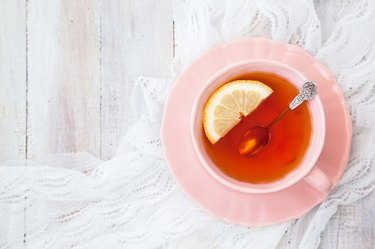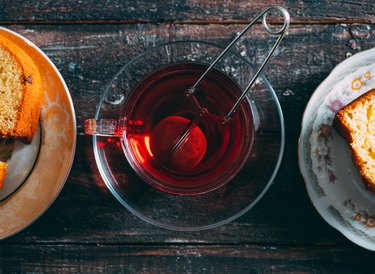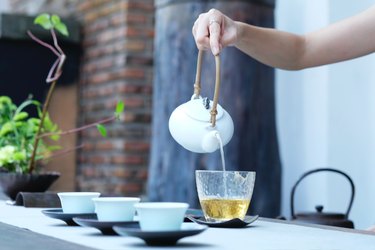
Other than plain water, tea is the most popular beverage in the world. With a wide variety of flavors, including green tea and herbal tea, this commonly consumed drink is both healthy and delicious. But before you sit down to steep your next cup, consider the pros and cons of hot tea versus cold tea.
Tip
The cold-infusion method of brewing tea may allow you to maximize the health benefits of tea.
Video of the Day
Hot Tea vs. Cold Tea
If you're a regular tea drinker, chances are, you prefer your beverage at a certain temperature. While the health benefits of drinking hot tea and cold tea outnumber any negatives that may occur, some research shows cold brewing at a longer duration may have more health benefits than steeping your leaves in hot water.
Video of the Day
The traditional way of making tea is to brew the leaves in hot water at a temperature ranging from 158 degrees Fahrenheit to over 200 F, according to a December 2015 study in the Journal of Food Science and Technology.
However, the researchers found that cold water steeping is reported to maximize tea health benefits, including a higher antioxidant activity and total phenolics and gallic acid content. But unfortunately, to achieve this, you need to allow the tea a longer infusion time.
Therefore, the researchers decided to test out a brief hot infusion step followed by ice on green, black and oolong teas. They looked at catechins, xanthines and gallic acid content, antioxidant power, total phenolics and color analysis.
They found that a short hot infusion step, followed by ice, showed similar properties of cold infusion in antioxidant activity, which is a result of the colder steeping methods preventing degradation of bioactive molecules caused by exposure to high temperature. Which means, you can still reap the benefits of cold infusion without waiting hours for your tea to be ready to drink.
Other Benefits of Cold Tea
In addition to a greater antioxidant power, cold brew may also be helpful for overweight patients who are at risk of cardiovascular complications. A small, April 2018 study published in the Frontiers in Physiology analyzed the cardiovascular, metabolic and cutaneous responses from 23 healthy subjects that drank unsweetened Yerba Mate tea ingested either at a cold or hot temperature.
And what they found was that subjects who drank cold, unsweetened caffeinated herbal tea experienced a greater stimulation of thermogenesis and fat oxidation than hot tea. Plus, the cold tea did not cause an increase in cardiac output work.
This may be helpful for individuals who have obesity, hypertension or other cardiovascular complications that cannot use thermogenic drugs. The researchers did note that this data is preliminary and further experiments are needed to determine the efficacy of unsweetened caffeinated cold tea for weight control.
Speaking of caffeine, your favorite cup of green or black tea typically comes with a dose of caffeine. The Mayo Clinic reports that an 8-ounce cup of black tea has anywhere from 25 to 48 milligrams of caffeine and an 8-ounce cup of green tea has 25 to 29 milligrams of caffeine.
If you're trying to cut back on caffeine, the study in the Journal of Food Science and Technology says that the caffeine in iced tea versus hot tea is less, even when using the same tea for both brewing methods. This is great news for anyone who wants to enjoy green or black tea without the side effects that often come with caffeine.
- Frontiers in Psychology: "Cardiovascular and Metabolic Responses to the Ingestion of Caffeinated Herbal Tea: Drink It Hot or Cold?"
- Journal of Food Science and Technology: "Effects of Alternative Steeping Methods on Composition, Antioxidant Property and Colour of Green, Black and Oolong Tea Infusions"
- The Mayo Clinic: "Caffeine Content for Coffee, Tea, Soda, and More"
Was this article helpful?
150 Characters Max
0/150
Thank you for sharing!
Thank you for your feedback!


